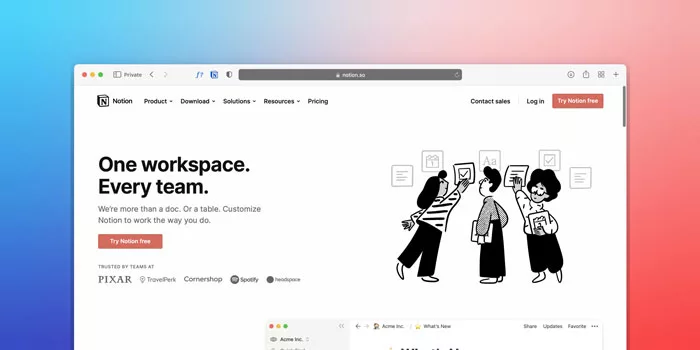We live in a world filled with creators – people who, with a pinch of imagination and a dash of hard work, can shape innovative, digital solutions to everyday problems. One such example is the burgeoning marketplace for Notion templates and the growing opportunity to make money selling Notion Templates.
What’s that? You’ve heard of Notion, right? It’s that uber-versatile, all-in-one workspace where you can write, plan, collaborate, and get organized. Notion claims it’s “all you need in one tool” — and if you’ve ever spent hours lost in the productivity wormhole that is Notion, you know that claim is hardly hyperbole.
Notion templates are rapidly growing in demand, and the market for them is getting riper every day. Now, I can almost hear your internal monologue, “But Dave, how do I fit into all this? How can I, an aspiring creator, make money selling Notion templates?”
Never fear, for you’re in the right place. This is your all-in-one guide to unlocking the treasure trove of opportunities that lie in selling Notion templates.

Table of Contents
Your New Canvas: The World of Notion Templates
Before we dive headlong into the ‘how’, let’s first address the ‘why’. You see, Notion templates are more than just pre-made setups or formatted files. They are the culmination of productivity hacks, process shortcuts, and a streamlined work environment. They represent efficiency, elegance, and most importantly, they save time. And, as we all know, in the digital era, time is money.
Understanding the Demand
Not everyone has the time, inclination, or even the know-how to craft their perfect workspace from scratch. Here’s where you come in. By crafting and selling Notion templates, you’re providing a product that people crave – simplicity.
Whether it’s a student who needs to organize their studying, a project manager who needs to keep a team on track, or a writer outlining their next novel, there’s a huge demand for Notion templates. And the best part? The market is still young. There’s plenty of room for the enterprising creator to make money selling Notion Templates.
The Key: Solving Problems
Now, you may ask, “What should my Notion template look like?” Here’s a piece of wisdom – the most successful products are not those that are the shiniest or the loudest; they’re the ones that solve a problem. When creating your Notion template, think about the problems that people face daily.
Are they drowning in cluttered to-do lists? Craft a template that neatly organizes tasks. Are they struggling with goal-setting? Design a template that breaks down long-term goals into manageable steps. The key is to empathize, identify pain points, and create a solution. The better the problem your template solves, the more value it holds.
Set Your Standards High
People are smart; they know the difference between a rush job and a labor of love. Your template isn’t just a tool; it’s a reflection of you. So, hold yourself to high standards. Make your template visually appealing, easy to use, and filled with value.
Just like an artist with a canvas, use Notion’s versatile palette of tools to create a masterpiece. When customers see the effort you’ve put into creating a comprehensive, elegant solution, they’ll be happy to pay for quality.
Packaging Your Solution
Once you’ve designed a fantastic template, the next step is marketing it. Remember, even the most incredible product will gather dust if people don’t know about it.
Start by crafting a compelling narrative around your template. Don’t just tell people that your product is great, show them why it’s great. Make them understand how much simpler, efficient, and enjoyable their life or work could be with your template. Use clear, vibrant language and visuals that resonate with your target audience.
Harness the Power of Social Proof
Here’s where social proof comes in handy. Humans are social creatures, and we place great value on the opinion of others. Reviews, testimonials, and endorsements from satisfied customers or influencers in your niche can do wonders for your product’s credibility.
Consider offering your template for free or at a discount to a select few in exchange for honest reviews. Positive testimonials serve as invaluable marketing tools, boosting customer confidence in your product.
Pricing: The Art and Science
Pricing is an art, and like any artist, you need to understand your medium. The perceived value of your product will guide the price tag you slap on it. Too low, and customers may question the quality. Too high, and you might scare potential buyers away.
Market research is your friend here. Look at what similar Notion templates are selling for and use this as a starting point. Experiment with your pricing, but remember – the value your template provides should always justify the price.
Find Your Place in the Market
There’s no ‘one size fits all’ marketplace for Notion templates. Some creators use platforms like Etsy or Gumroad, while others prefer to sell directly from their own websites. Choose the platform that suits you best, keeping in mind factors like fees, audience reach, and control over branding and customer relationships.
Continuous Evolution
Finally, don’t let your Notion template stagnate. Just like everything in the digital world, evolution is key. Regularly review feedback from your customers, and don’t be afraid to make updates and enhancements. This ensures your product stays relevant and continues to deliver value over time.

A 5 step quick start guide to Making Money Selling Notion Templates
Now that you’re armed with the knowledge of what makes a great Notion template, let’s dive into how you can actually make money selling Notion templates.
1. Building Your Portfolio
Your first step should be creating a diverse portfolio of your Notion templates. This serves two main purposes: it showcases your abilities and style, and it offers prospective customers a taste of what they can expect from you. Make sure you have templates that cater to a variety of use cases – from content management, project planning, personal productivity, to digital note-taking.
2. Setting Up a Sales Platform
To sell your templates, you’ll need a platform. You have multiple options here. You could create your own website, use a digital marketplace like Etsy, or leverage a platform designed specifically for digital products, like Gumroad or Sellfy.
Each platform comes with its advantages and disadvantages, so consider factors like transaction fees, audience reach, customization capabilities, and ease of use before deciding.
3. Pricing Your Templates
Setting the right price for your templates can be tricky. You don’t want to undervalue your work, but you also don’t want to scare off potential customers with steep prices.
Do some market research. What are others charging for similar products? How does the quality of your templates compare to theirs? Keep in mind that the perceived value of your templates plays a significant role in pricing.
4. Promoting Your Templates
Promotion is key to getting your templates in front of potential buyers. Consider leveraging your existing social media platforms or starting a blog to share valuable content related to productivity and the use of Notion.
Partner with influencers or bloggers in your niche. Offer a free template in exchange for a review or a feature on their platform. Additionally, consider paid advertising, SEO, and email marketing as methods to reach a broader audience.
5. Offering Stellar Customer Service
Last but definitely not least, remember that your job doesn’t end when a template is sold. Offering excellent customer service can set you apart from the competition. Respond to queries quickly, be open to feedback, and continuously strive to improve your products based on customer inputs. Remember, a happy customer is not only likely to buy from you again but also more likely to refer you to others.
Selling Notion templates can be both rewarding and profitable. However, it requires dedication, creativity, and a deep understanding of the needs and wants of your target audience. Keep improving, keep innovating, and you’ll find your corner in this exciting digital marketplace.
Embrace the Notion (pun intended!)
In conclusion, make money selling Notion templates in 2023 is more than just a trendy opportunity; it’s a canvas for creative expression, problem-solving, and most importantly, a way to provide immense value for others.
Yes, there are nuances to consider, standards to uphold, and decisions to make. But remember – this is your journey. It’s not about mimicking what’s been done before. It’s about carving your unique path in the vast world of digital products.
So, go ahead, embrace the notion! Let’s make our digital lives a little more organized, a little more efficient, and a lot more enjoyable. Let’s make money selling Notion templates, one amazing creation at a time.
Frequently Asked Questions (FAQs) about how to make money selling Notion templates:
1. Q: How do I create a Notion template?
A: Creating a Notion template requires you to design a customizable and reusable layout using Notion’s built-in functions. Consider your users’ needs and design a layout that would simplify their tasks.
2. Q: How much money can I make selling Notion templates?
A: The income from selling Notion templates can vary significantly. It depends on factors like the quality of your templates, your marketing efforts, and the pricing strategy you adopt. Some sellers make a few hundred dollars a month, while others make a full-time income.
3. Q: How can I differentiate my templates from others on the market?
A: To stand out, focus on creating high-quality templates that address specific user needs. Keep improving based on feedback and market demands. Your unique design style and exceptional customer service can also set you apart.
4. Q: How can I attract customers to buy my templates?
A: Effective marketing strategies are key. Leverage social media, SEO, content marketing, and influencer partnerships to reach your target audience. Offering freebies or discounts can also attract potential customers.
5. Q: Can I sell my templates on multiple platforms?
A: Yes, you can sell your templates on as many platforms as you wish. Just ensure you comply with the terms and conditions of each platform.
6. Q: How should I price my templates?
A: Pricing depends on several factors, including the complexity of the template, the value it offers, and the market rates. Conduct market research and experiment with different price points to find what works best.
7. Q: What if a customer has issues with my template?
A: Great customer service is key. Address any issues promptly and professionally. Remember, a happy customer could lead to more sales through positive reviews and referrals.

